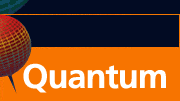CONTACTS
- Coordinator
Adolfo del Campo
-
Quantum Lunch Location:
T-Division Conference Room, TA-3,
Building 123, Room 121
 |


Quantum Institute: Visitor Schedule
The Quantum Lunch is regularly held on Thursdays in the Theoretical Division Conference Room, TA-3, Building 123, Room 121.
The organizing committee includes Ryan O. Behunin (T-4 & CNLS), Malcolm Boshier (P-21), Adolfo del Campo (T-4 & CNLS), Michael Di Rosa (C-PCS), Ivar Martin (T-4), Changhyun Ryu (P-21), Rolando D. Somma (T-4), Christopher Ticknor (T-1), and Wojciech H. Zurek (T-4).
For more information, or to nominate a speaker, contact Adolfo del Campo.
To add your name to the Quantum Lunch email list, contact Ellie Vigil.
Thursday, December 6, 2012
12:30 PM - 2:00 PM
Speaker: Xinxin Zhao (C-NR)
Technical Host:
TOPIC: Observation of the Deexcitation of the 229mTh Nuclear Isomer
Abstract
The 229Th nucleus possesses the lowest-energy nuclear isomeric state. Two widely accepted indirect measurements of the transition energy place it within reach of existing laser capabilities. Direct searches for the isomer deexcitation have proven elusive despite extensive effort over the past couple of decades. There is now a growing interest in finding this unique transition because of its potential applications in nuclear, atomic, condensed matter, and optical physics, quantum information, metrology, and cosmology, including the development of a new type of clock based on this nuclear transition. In this Letter we report the first direct observation of the deexcitation of the lowest-lying isomeric state in 229Th. By collecting 229Th recoils following the alpha decay of 233U into MgF2 plates and measuring the subsequent light emission, we have isolated the isomer deexcitation and measured the transition’s half-life to be 6±1h. Through comparison measurements with 235mU isomer, we found that the observed 229mTh deexcitation signal originates from photon emission rather than internal conversion electron emission. This discovery lays the groundwork for optical and laser spectroscopy of 229mTh nuclear isomer and the development of a 229Th nuclear clock.
|


